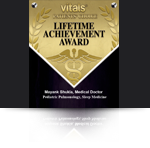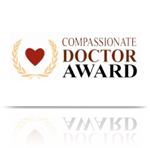Ready to Schedule an
Appointment with Dr. Shukla?
Appointment with Dr. Shukla?
40 million Americans suffer from chronic sleep disorders each year and that number is only growing. Sleep deprivation not only makes a person exhausted, it also increases anxiety, worsens mood, and can even be linked to major medical problems like heart disease. Fortunately, lifestyle changes and medical intervention can provide sleep disorder sufferers with some much needed rest.
Changes in sleep hygiene is the primary form of treatment for sleep disorders. Sleep hygiene simply refers to the habits and practices surrounding one’s sleep and bedtime routine, yet despite the simple meaning, most of us have very poor sleep hygiene. For example, how many of us lay in bed watching television or using phones, tablets, or laptops? Not only does the blue light emitted from these screens inhibit sleep, but doing anything other sleeping in bed prevents your brain from seeing your bed as a place for rest. For this reason, try to avoid doing anything in bed except for sleep and sex, even reading for an extended time can lead to tossing and turning. If you can’t sleep, get up and spend some time engaging in a quiet activity for a while before trying again. Watching the clock only increases anxiety and makes it even more difficult to find sleep.
It’s also important to try to maintain a regular sleep schedule. While it’s tempting to take naps and sleep in on weekends in an attempt to get in a few more hours of rest, this often has an inverse effect. These irregular hours can mean that your body isn’t ready to sleep when you go to bed in the evening, and can disrupt the daily cycle of hormones emitted by your brain, including those that control feelings of sleepiness and alertness.
Generally, there is little to no need to make significant changes to one’s diet in order to treat a sleep disorder. However, patients should try to avoid nicotine and caffeine, which are stimulants, especially late in the day. Alcohol may make you sleepy and even help you fall asleep, but it significantly degrades sleep quality. Patients should also avoid spicy foods and large meals, which can prompt digestive issues, before bed. Some patients may find that a specific food or type of food, such as dairy, can trigger their sleep problems. Disorders like sleep apnea can often be treated simply by losing weight. Sleep quality can also often be improved by proper hydration, but patients should be sure to drink water throughout the day, as drinking too much too close to bedtime can keep you up making trips to the bathroom. Many people find warm milk or decaffeinated tea to be soothing before bed.
There are a number of different drugs that your doctor may prescribe to help with chronic sleep problems. Generally, hypnotic (sleep inducing) drugs are only approved for 2 weeks or less of continuous use in order to restore a normal sleep pattern because of the risk of dependency and side effects. The specific medication prescribed will depend on the nature of your disorder. For example, if your hormone cycles on skewed, your doctor may prescribe a drug like tasimelteon (hetlioz) which can normalize your hormone release, but if your hormones are normal, but you have trouble staying asleep, your doctor may prescribe a sedative like zolpidem or zaleplon.
Whenever you’re prescribed a new medication you should always take care to watch out for side effects. This is especially important for sleep medications which can aggravate mental illness, interfere with one’s ability to drive, and impair judgement.
Cognitive therapy is seldom helpful for patients whose chronic sleep problems are a result of a physical problem, like restless leg syndrome or breathing issues. However, for people who have trouble sleeping related to seasonal depressive disorder, attention deficit disorder, or an anxiety disorder, cognitive therapy can help improve mood and reduce anxiety and agitation helping sufferers sleep, as well as provide patients with a personalized set of strategies to help them sleep.
Some people have found success in supplements like St. John’s wort, SAMe (S-adenosyl–L-methionine), melatonin, and omega-3 fatty acids to help sleep and reduce other possible symptoms. It’s important to remember, though, that supplements often aren’t FDA approved, meaning that you can’t always be certain what you’re getting and if it’s safe. It’s also important to keep in mind that they may interact with drugs you already take. Always talk to a doctor before introducing supplements to your healthcare routine.
















